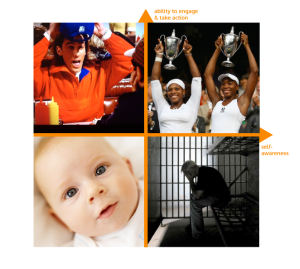Yes, I know, I missed posting yesterday. I’ll make it up to you over the weekend.
Anyway, I’ve been continuing to have conversations with people in the creative and technology industries about avoiding techno-dystopia. And as I was discussing this with a friend who doesn’t work in that domain (yes, I have them, shut up), something occurred to me that I’ve been taking as a given but never articulated: a lot of how we receive the new technology we’re given, and a lot of how we put it to use, and in turn a lot of how it affects society broadly and us as individuals, is down to our levels of self-awareness.
This is a little simplistic, but I threw together a graphic to illustrate my point:
We all (I think) aspire to be in the top right quadrant, where we know ourselves and are in control of our circumstances. And even though we are often less self-aware than we think we are, we laugh at those in the top left, who range from hapless but amusing B list celebrities to the sometimes positively dangerous winners of the Darwin Awards. Babies are cute but not exactly adult role models (though I will admit to the odd moment of envy of my godchildren), and I’m pretty sure nobody actually wants to be a prisoner.
Yet when we thoughtlessly adopt technology, we move along these axes. It’s not the tech, it’s us – the people who use it, and the ways that we do.
If I let an algorithm tell me who I am, what I like and whom I should be friends with, I am sliding from right to left. When I hand over control of what I eat, when I exercise, when I sleep and what time I get up, I slip from top to bottom. I’m not saying technology can’t help us make decisions, but I am saying that we should still be taking responsibility for those decisions, making sure we remain engaged. Life is full of compromises, it’s a matter of being aware of them.
There have been so many articles over the past few years about the horrible bullying and shaming that goes on in the online/socially networked world. Some of these stories are truly tragic, and lives have been ruined and lost. But the technology is no more at fault than a knife is in a stabbing. It’s the person wielding it who’s made the decision, and it’s the people wielding it collectively – i.e. all of us – that need to make better decisions.
The implications of new technology extend far beyond the sphere of influence of those who make it, designers and technologists and the like. One of the great challenges in any period of great change is for society to adapt, to learn to embrace the new in a positive way. I’m not one of those people who’s going to tell you to stop using email, or go back to an ancient feature phone, or anything like that. But I am encouraging you, me, all of us to be a bit more thoughtful about what we adopt and how we use it, a bit more curious about how it all works and what it’s doing, both for us and to us.
